Draft verses composed by Sir Thomas Sackville, Lord Buckhurst, comprising thirty lines, beginning “Two woorthie knightes and Hobbyes both by name/Inclosed within this marble stone do rest...” and ending “...Thus live they deade & we learne well thereby/That ye & we and all the worlde most die”, with several revisions, some made currente calamo, inscribed at the end in the same hand “Tho” (deleted) “T.B. (1. Thomas Buckhurst)”, one page, folio, on the first page of a bifolium, hand-and-star watermark, integral blank with near contemporary docket, guard, blank strengthened at folds, some light dust-staining and damp-staining, no date [?1592] Sir Thomas Sackville (1536-1608), created Baron Buckhurst in 1567 and Earl of Dorset in 1604, successor to Lord Burghley as Lord High Treasurer (see the lots above), was co-author of the first English tragedy in blank verse, Gorboduc (1560) and author of the ‘Induction´ and ‘Complaint of Buckingham´ in A Mirror for Magistrates (1563). He also wrote a commendatory sonnet prefixed to Sir Thomas Hoby´s Courtyer (1561), the iconic Elizabethan translation of Castiglione´s Cortegiano (an important influence on Shakespeare, Spenser, Jonson and others). The present verses comprise a eulogy on the same Sir Thomas Hoby (1530-1566), who as well as translating the Courtier was Ambassador to France, and his elder half-brother, Sir Philip Hoby (1505-1558), likewise a diplomat, and a friend of Titian and Aretino. Sir Thomas´s widow, Elizabeth (1528-1609), was one of a trio of daughters of Sir Anthony Cooke of Gidea Hall, accounted the most learned women of their time, one sister marrying Lord Burghley, the other being the mother of Sir Francis Bacon Elizabeth Hoby, afterwards Lady Russell, erected a monument and chapel at the church adjoining the family seat of Bisham Abbey, near Cookham, Berks, to her husband and his brother. Queen Elizabeth visited Bisham in 1592, and an Entertainment was staged in her honour. This was published in the same year by the Oxford printer Joseph Barnes, as Speeches Delivered to Her Majesty this last Progress, at the Right Honourable the Lady Russell´s, at Bisham... (The Complete Works of John Lyly, edited by R.W. Bond, 1902; for a recent discussion of the auspices of which see Alexandra Johnston ‘‘The lady of the farme´: The Context of Lady Russell´s Entertainment of Elizabeth at Bisham, 1592´, in Early Theatre 5.2, 2002). While the present verses are not included in the allegorical goings-on published by Barnes (which have long been attributed to John Lyly), it seems possible – if no more – that they were composed with the same occasion in mind. This manuscript presents several points of interest. It is clearly, with its deletions and alterations, some sort of working draft, and the verses are clearly by Sackville. Physically, it can be regarded as an example of an Elizabethan ‘foul paper´, that is to say a rough draft written on a folded four-page foolscap sheet as supplied by the stationers of the time (see W.W. Gregg, Dramatic Documents from the Elizabethan Playhouses, 1931, p.197ff). Barnes, the printer of the Bisham Entertainment, himself wrote that “I gathered these copies in loose papers I know not how imperfect, therefore I must crave a double pardon; of him that penned them, and those that read them”. But while our manuscript is certainly a draft and pretty certainly by Sackville, it is equally certainly not in Sackville´s hand (see for example the autograph letter by him in the present sale, as well as samples reproduced by Croft, Autograph Poetry in the English Language and Greg, English Literary Autographs). The alterations it exhibits are, perhaps, of an auditory nature, for example “possest” has been deleted and replaced by “profest”, and four lines below “possessing” deleted and replaced (in mid-writing rather than after the event) by “possest”. Whoever has written the text has written out Buckhurst´s name at the end by way of identifying a third-party rather
Draft verses composed by Sir Thomas Sackville, Lord Buckhurst, comprising thirty lines, beginning “Two woorthie knightes and Hobbyes both by name/Inclosed within this marble stone do rest...” and ending “...Thus live they deade & we learne well thereby/That ye & we and all the worlde most die”, with several revisions, some made currente calamo, inscribed at the end in the same hand “Tho” (deleted) “T.B. (1. Thomas Buckhurst)”, one page, folio, on the first page of a bifolium, hand-and-star watermark, integral blank with near contemporary docket, guard, blank strengthened at folds, some light dust-staining and damp-staining, no date [?1592] Sir Thomas Sackville (1536-1608), created Baron Buckhurst in 1567 and Earl of Dorset in 1604, successor to Lord Burghley as Lord High Treasurer (see the lots above), was co-author of the first English tragedy in blank verse, Gorboduc (1560) and author of the ‘Induction´ and ‘Complaint of Buckingham´ in A Mirror for Magistrates (1563). He also wrote a commendatory sonnet prefixed to Sir Thomas Hoby´s Courtyer (1561), the iconic Elizabethan translation of Castiglione´s Cortegiano (an important influence on Shakespeare, Spenser, Jonson and others). The present verses comprise a eulogy on the same Sir Thomas Hoby (1530-1566), who as well as translating the Courtier was Ambassador to France, and his elder half-brother, Sir Philip Hoby (1505-1558), likewise a diplomat, and a friend of Titian and Aretino. Sir Thomas´s widow, Elizabeth (1528-1609), was one of a trio of daughters of Sir Anthony Cooke of Gidea Hall, accounted the most learned women of their time, one sister marrying Lord Burghley, the other being the mother of Sir Francis Bacon Elizabeth Hoby, afterwards Lady Russell, erected a monument and chapel at the church adjoining the family seat of Bisham Abbey, near Cookham, Berks, to her husband and his brother. Queen Elizabeth visited Bisham in 1592, and an Entertainment was staged in her honour. This was published in the same year by the Oxford printer Joseph Barnes, as Speeches Delivered to Her Majesty this last Progress, at the Right Honourable the Lady Russell´s, at Bisham... (The Complete Works of John Lyly, edited by R.W. Bond, 1902; for a recent discussion of the auspices of which see Alexandra Johnston ‘‘The lady of the farme´: The Context of Lady Russell´s Entertainment of Elizabeth at Bisham, 1592´, in Early Theatre 5.2, 2002). While the present verses are not included in the allegorical goings-on published by Barnes (which have long been attributed to John Lyly), it seems possible – if no more – that they were composed with the same occasion in mind. This manuscript presents several points of interest. It is clearly, with its deletions and alterations, some sort of working draft, and the verses are clearly by Sackville. Physically, it can be regarded as an example of an Elizabethan ‘foul paper´, that is to say a rough draft written on a folded four-page foolscap sheet as supplied by the stationers of the time (see W.W. Gregg, Dramatic Documents from the Elizabethan Playhouses, 1931, p.197ff). Barnes, the printer of the Bisham Entertainment, himself wrote that “I gathered these copies in loose papers I know not how imperfect, therefore I must crave a double pardon; of him that penned them, and those that read them”. But while our manuscript is certainly a draft and pretty certainly by Sackville, it is equally certainly not in Sackville´s hand (see for example the autograph letter by him in the present sale, as well as samples reproduced by Croft, Autograph Poetry in the English Language and Greg, English Literary Autographs). The alterations it exhibits are, perhaps, of an auditory nature, for example “possest” has been deleted and replaced by “profest”, and four lines below “possessing” deleted and replaced (in mid-writing rather than after the event) by “possest”. Whoever has written the text has written out Buckhurst´s name at the end by way of identifying a third-party rather



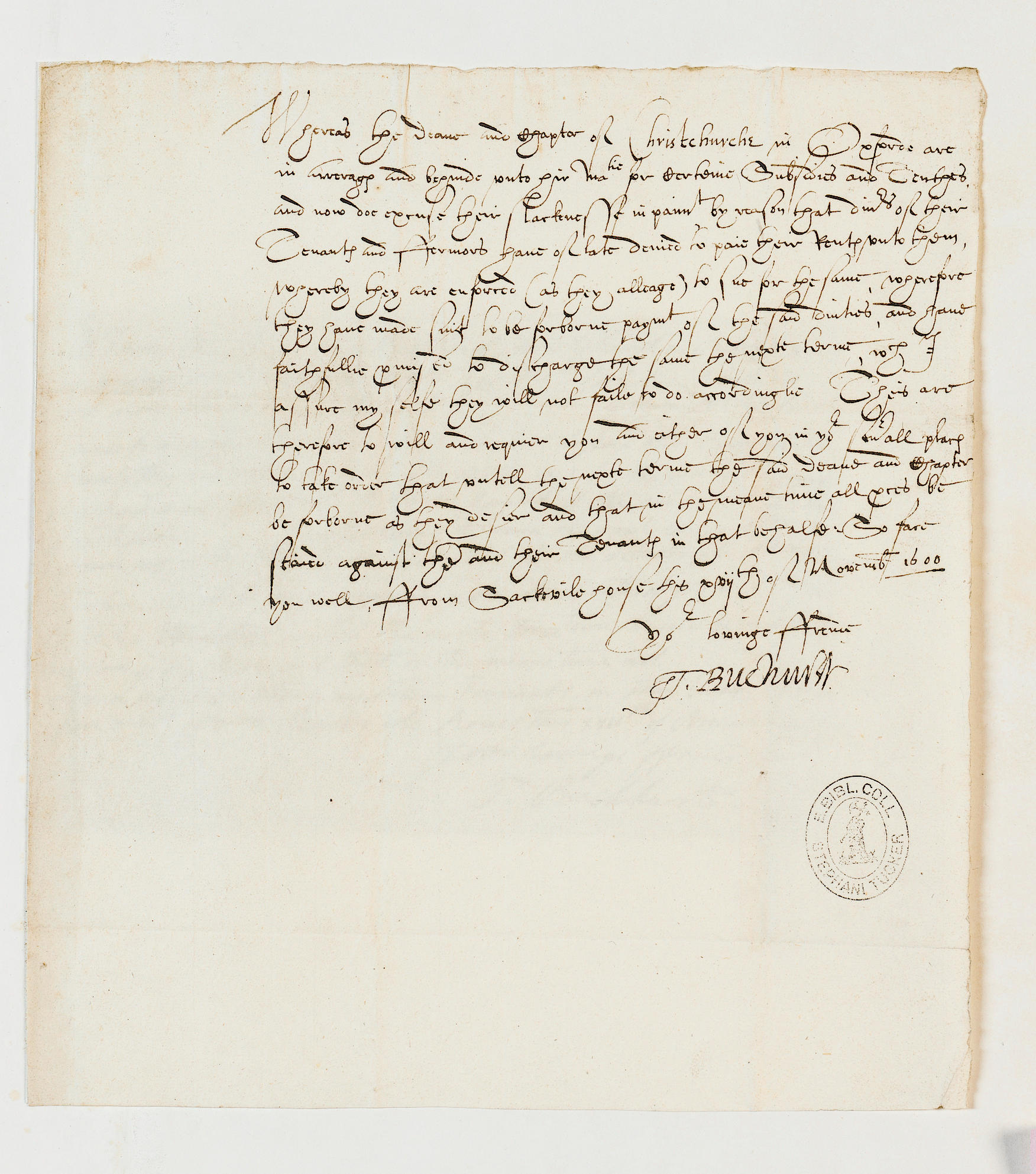

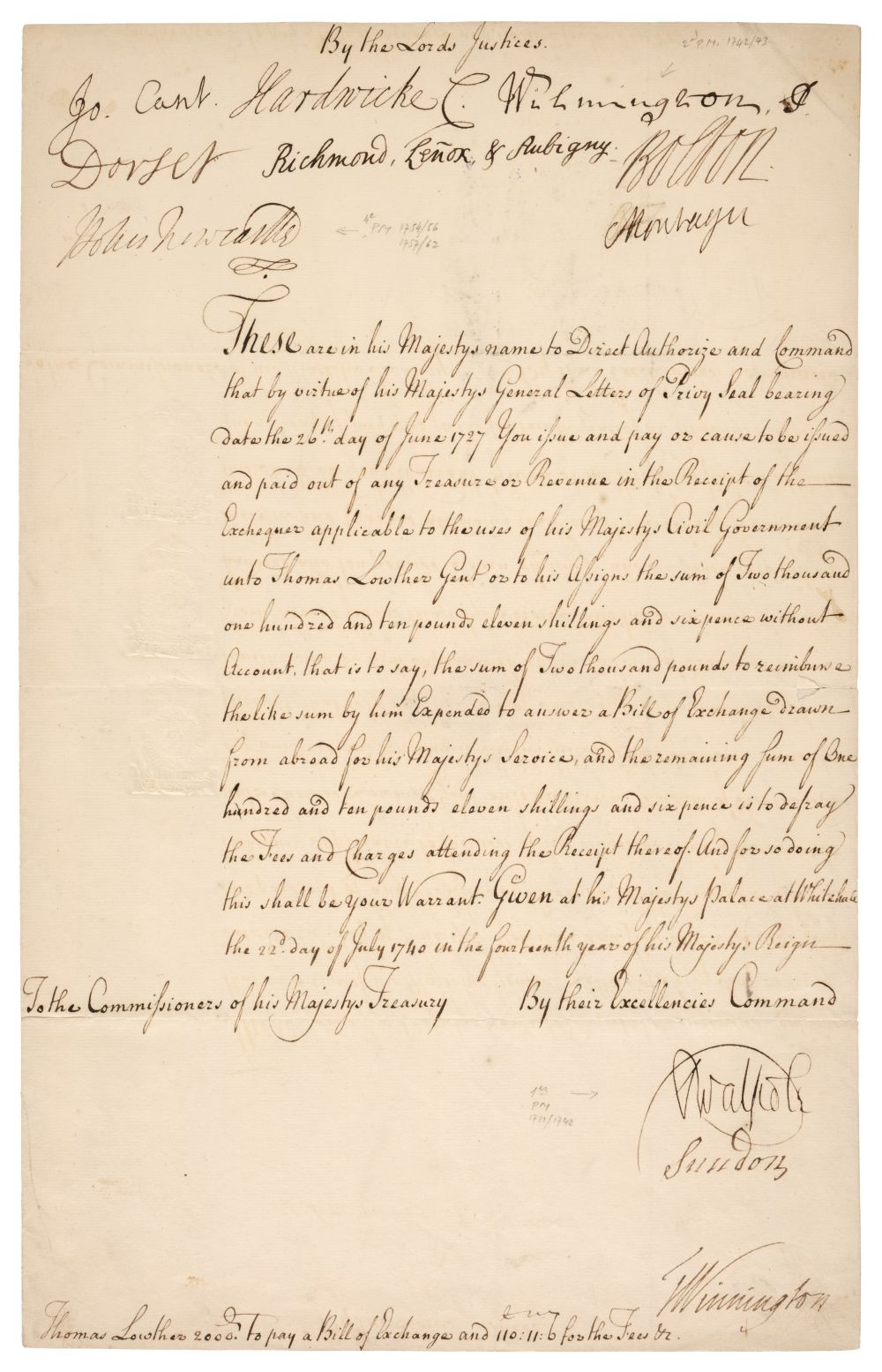


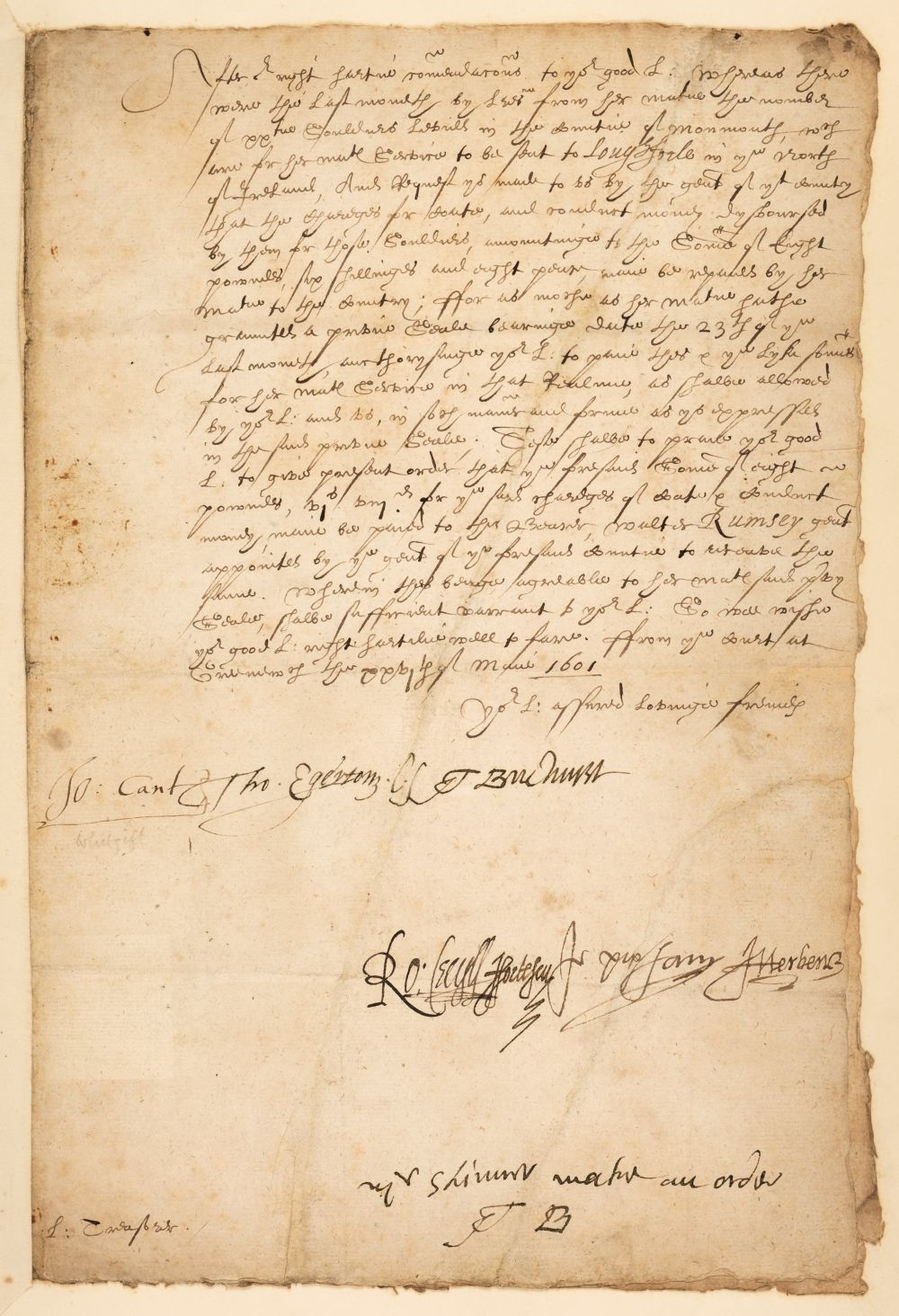

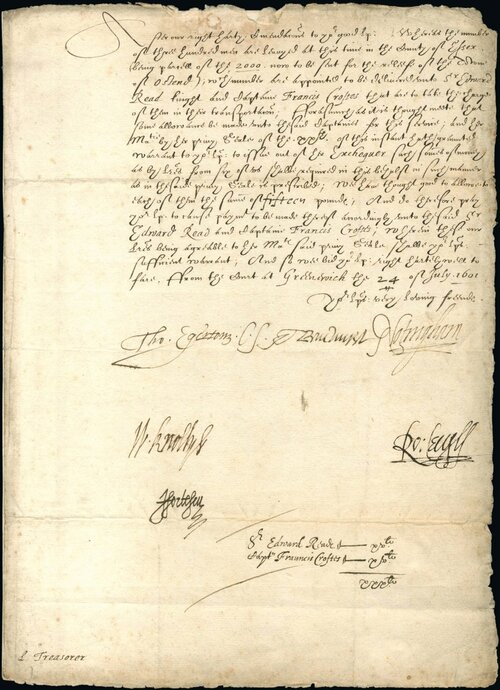

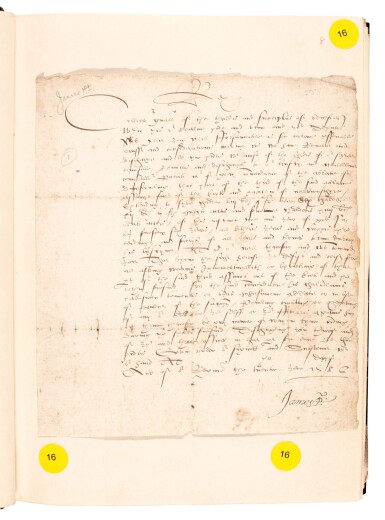
Testen Sie LotSearch und seine Premium-Features 7 Tage - ohne Kosten!
Lassen Sie sich automatisch über neue Objekte in kommenden Auktionen benachrichtigen.
Suchauftrag anlegen